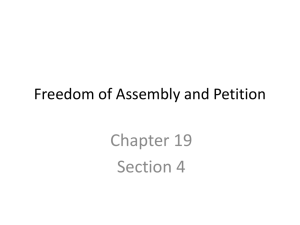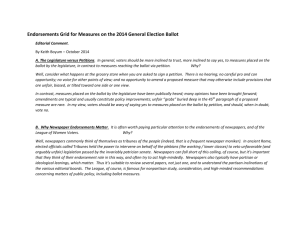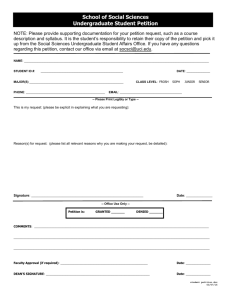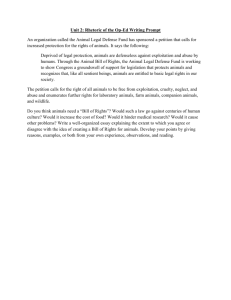Mississippi Constitution Article 15 Amendments to the Constitution
advertisement
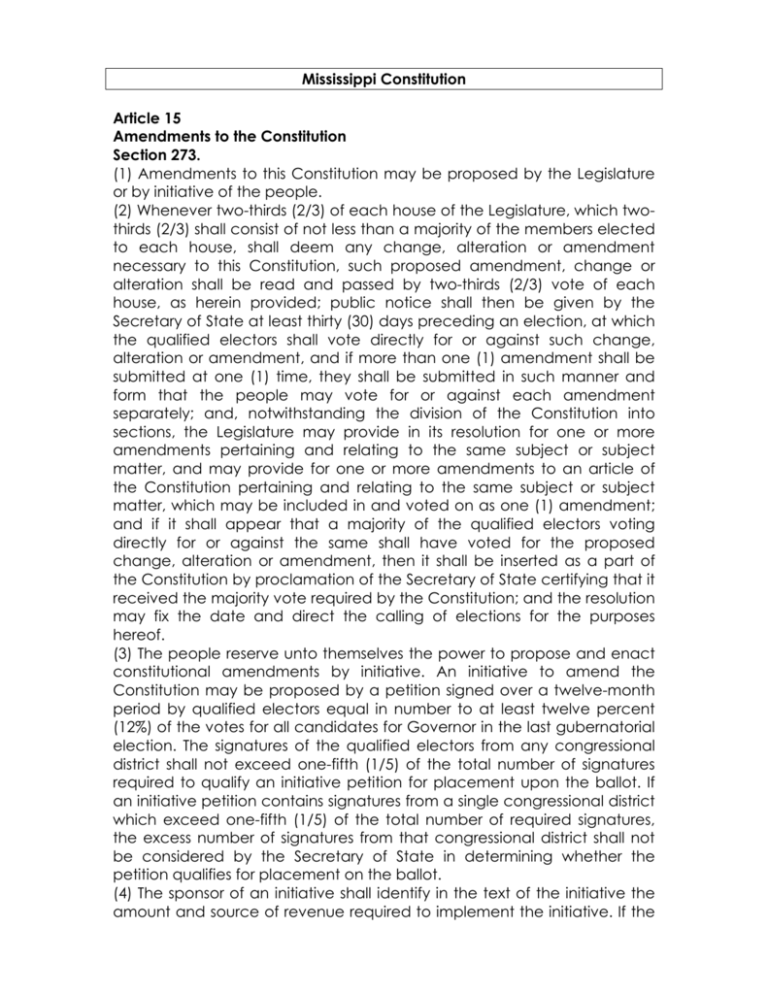
Mississippi Constitution Article 15 Amendments to the Constitution Section 273. (1) Amendments to this Constitution may be proposed by the Legislature or by initiative of the people. (2) Whenever two-thirds (2/3) of each house of the Legislature, which twothirds (2/3) shall consist of not less than a majority of the members elected to each house, shall deem any change, alteration or amendment necessary to this Constitution, such proposed amendment, change or alteration shall be read and passed by two-thirds (2/3) vote of each house, as herein provided; public notice shall then be given by the Secretary of State at least thirty (30) days preceding an election, at which the qualified electors shall vote directly for or against such change, alteration or amendment, and if more than one (1) amendment shall be submitted at one (1) time, they shall be submitted in such manner and form that the people may vote for or against each amendment separately; and, notwithstanding the division of the Constitution into sections, the Legislature may provide in its resolution for one or more amendments pertaining and relating to the same subject or subject matter, and may provide for one or more amendments to an article of the Constitution pertaining and relating to the same subject or subject matter, which may be included in and voted on as one (1) amendment; and if it shall appear that a majority of the qualified electors voting directly for or against the same shall have voted for the proposed change, alteration or amendment, then it shall be inserted as a part of the Constitution by proclamation of the Secretary of State certifying that it received the majority vote required by the Constitution; and the resolution may fix the date and direct the calling of elections for the purposes hereof. (3) The people reserve unto themselves the power to propose and enact constitutional amendments by initiative. An initiative to amend the Constitution may be proposed by a petition signed over a twelve-month period by qualified electors equal in number to at least twelve percent (12%) of the votes for all candidates for Governor in the last gubernatorial election. The signatures of the qualified electors from any congressional district shall not exceed one-fifth (1/5) of the total number of signatures required to qualify an initiative petition for placement upon the ballot. If an initiative petition contains signatures from a single congressional district which exceed one-fifth (1/5) of the total number of required signatures, the excess number of signatures from that congressional district shall not be considered by the Secretary of State in determining whether the petition qualifies for placement on the ballot. (4) The sponsor of an initiative shall identify in the text of the initiative the amount and source of revenue required to implement the initiative. If the initiative requires a reduction in any source of government revenue, or a reallocation of funding from currently funded programs, the sponsor shall identify in the text of the initiative the program or programs whose funding must be reduced or eliminated to implement the initiative. Compliance with this requirement shall not be a violation of the subject matter requirements of this section of the Constitution. (5) The initiative process shall not be used: (a) For the proposal, modification or repeal of any portion of the Bill of Rights of this Constitution; (b) To amend or repeal any law or any provision of the Constitution relating to the Mississippi Public Employees’ Retirement System; (c) To amend or repeal the constitutional guarantee that the right of any person to work shall not be denied or abridged on account of membership or nonmembership in any labor union or organization; or (d) To modify the initiative process for proposing amendments to this Constitution. (6) The Secretary of State shall file with the Clerk of the House and the Secretary of the Senate the complete text of the certified initiative on the first day of the regular session. A constitutional initiative may be adopted by a majority vote of each house of the Legislature. If the initiative is adopted, amended or rejected by the Legislature; or if no action is taken within four (4) months of the date that the initiative is filed with the Legislature, the Secretary of State shall place the initiative on the ballot for the next statewide general election. The chief legislative budget officer shall prepare a fiscal analysis of each initiative and each legislative alternative. A summary of each fiscal analysis shall appear on the ballot. (7) If the Legislature amends an initiative, the amended version and the original initiative shall be submitted to the electors. An initiative or legislative alternative must receive a majority of the votes thereon and not less than forty percent (40%) of the total votes cast at the election at which the measure was submitted to be approved. If conflicting initiatives or legislative alternatives are approved at the same election, the initiative or legislative alternative receiving the highest number of affirmative votes shall prevail. (8) If an initiative measure proposed to the Legislature has been rejected by the Legislature and an alternative measure is passed by the Legislature in lieu thereof, the ballot titles of both such measures shall be so printed on the official ballots that a voter can express separately two (2) preferences: First, by voting for the approval of either measure or against both measures, and, secondly, by voting for one measure or the other measure. If the majority of those voting on the first issue is against both measures, then both measures fail, but in that case the votes on the second issue nevertheless shall be carefully counted and made public. If a majority voting on the first issue is for the approval of either measure, then the measure receiving a majority of the votes on the second issue and also receiving not less than forty percent (40%) of the total votes cast at the election at which the measure was submitted for approval shall be law. Any person who votes for the ratification of either measure on the first issue must vote for one (l) of the measures on the second issue in order for the ballot to be valid. Any person who votes against both measures on the first issue may vote but shall not be required to vote for any of the measures on the second issue in order for the ballot to be valid. Substantially the following form shall be a compliance with this subsection: Initiative Measure No. __, entitled (here insert the ballot title of the initiative measure). Alternative Measure No. __ A, entitled (here insert the ballot title of the alternative measure). VOTE FOR APPROVAL OF EITHER, OR AGAINST BOTH: FOR APPROVAL OF EITHER Initiative No. __ OR Alternative No. __ A .............................() AGAINST Both Initiative No. __ AND Alternative No. __ A ............................() FOR Initiative Measure No. __ ....................... () FOR Alternative Measure No. __ A .....................() (9) No more than five (5) initiative proposals shall be submitted to the voters on a single ballot, and the first five (5) initiative proposals submitted to the Secretary of State with sufficient petitions shall be the proposals which are submitted to the voters. The sufficiency of petitions shall be decided in the first instance by the Secretary of State, subject to review by the Supreme Court of the state, which shall have original and exclusive jurisdiction over all such cases. (10) An initiative approved by the electors shall take effect thirty (30) days from the date of the official declaration of the vote by the Secretary of State, unless the measure provides otherwise. (11) If any amendment to the Constitution proposed by initiative petition is rejected by a majority of the qualified electors voting thereon, no initiative petition proposing the same, or substantially the same, amendment shall be submitted to the electors for at least two (2) years after the date of the election on such amendment. (12) The Legislature shall provide by law the manner in which initiative petitions shall be circulated, presented and certified. (13) The Legislature may enact laws to carry out the provisions of this section but shall in no way restrict or impair the provisions of this section or the powers herein reserved to the people. Mississippi Statutes Chapter 17 § 23-17-1. Procedures by which qualified electors may initiate proposed amendments to the constitution (1) For purposes of this chapter, the following term shall have the meaning ascribed herein: "Measure" means an amendment to the Mississippi Constitution proposed by a petition of qualified electors under Section 273, Mississippi Constitution of 1890. (2) If any qualified elector of the state desires to initiate a proposed amendment to the Constitution of this state as authorized by subsections (3) through (13) of Section 273 of the Mississippi Constitution of 1890, he shall first file with the Secretary of State a typewritten copy of the proposed initiative measure, accompanied by an affidavit that the sponsor is a qualified elector of this state. (3) The sponsor of an initiative shall identify in the text of the initiative the amount and source of revenue required to implement the initiative. If the initiative requires a reduction in any source of government revenue, or a reallocation of funding from currently funded programs, the sponsor shall identify in the text of the initiative the program or programs whose funding must be reduced or eliminated to implement the initiative. (4) The person proposing the measure shall also include all the information required under Section 273, Mississippi Constitution of 1890. § 23-17-3. Time for filing petition; length of time petition remains valid. The petition for a proposed initiative measure must be filed with the Secretary of State not less than ninety (90) days before the first day of the regular session of the Legislature at which it is to be submitted. A petition is valid for a period of twelve (12) months. § 23-17-5. Submission of proposed initiative to Attorney General; review; recommendations; certificate of review; filing of proposed initiative and certificate. Upon receipt of any proposed initiative measure, the Secretary of State shall submit a copy of the proposed measure to the Attorney General and give notice to the person filing the proposed measure of such transmittal. Upon receipt of the measure, the Attorney General may confer with the person filing the proposed measure and shall within ten (10) working days from receipt thereof review the proposal for matters of form and style, and such matters of substantive import as may be agreeable to the person filing the proposed measure, and shall recommend such revision or alteration of the measure as may be deemed necessary and appropriate. The recommendations of the Attorney General shall be advisory only, and the person filing the proposed measure may accept or reject them in whole or in part. The Attorney General shall issue a certificate of review certifying that he has reviewed the measure for form and style and that the recommendations thereon, if any, have been communicated to the person filing the proposed measure, and such certificate shall issue whether or not the person filing the proposed measure accepts such recommendations. Within fifteen (15) working days after notification of submittal of the proposed initiative measure to the Attorney General, the person filing the proposed measure, if he desires to proceed with his sponsorship, shall file the measure together with the certificate of review with the Secretary of State for assignment of a serial number and the Secretary of State shall thereupon submit to the Attorney General a certified copy of the measure filed. Upon submitting the proposal to the Secretary of State for assignment of a serial number the Secretary of State shall refuse to make such assignment unless the proposal is accompanied by a certificate of review. § 23-17-7. Assignment of serial number; designation as "Initiative Measure No.." The Secretary of State shall give a serial number to each initiative measure, and forthwith transmit one (1) copy of the measure proposed bearing its serial number to the Attorney General. Thereafter, a measure shall be known and designated on all petitions, ballots and proceedings as "Initiative Measure No.." § 23-17-9. Formulation of ballot title and summary of initiative measure. Within seven (7) calendar days after the receipt of an initiative measure, the Attorney General shall formulate and transmit to the Secretary of State a concise statement posed as a question and not to exceed twenty (20) words, bearing the serial number of the measure and a summary of the measure, not to exceed seventy-five (75) words, to follow the statement. The statement shall give a true and impartial statement of the purpose of the measure. Neither the statement nor the summary may intentionally be an argument, nor likely to create prejudice, either for or against the measure. Such concise statement shall constitute the ballot title. The ballot title formulated by the Attorney General shall be the ballot title of the measure unless changed on appeal. When practicable, the question posed by the ballot title shall be written in such a way that an affirmative answer to such question and an affirmative vote on the measure would result in a change in then current law, and a negative answer to the question and a negative vote on the measure would result in no change to then current law. § 23-17-11. Notice of ballot title and summary to initiator; publication of title and summary. Upon the filing of the ballot title and summary for an initiative measure in his office, the Secretary of State shall forthwith notify by certified mail return receipt requested, the person proposing the measure and any other individuals who have made written request for such notification of the exact language of the ballot title. The Secretary of State shall publish the title and summary for an initiative measure within ten (10) days after filing such title and summary in a newspaper or newspapers of general circulation throughout the State of Mississippi. § 23-17-13. Procedure for appeal of title and summary. If any person is dissatisfied with the ballot title or summary formulated by the Attorney General, he or she may, within five (5) days from the publications of the ballot title and summary by the office of the Secretary of State, appeal to the circuit court of the First Judicial District of Hinds County by petition setting forth the measure, the title or summary formulated by the Attorney General, and his or her objections to the ballot title or summary and requesting amendment of the title or summary by the court. A copy of the petition on appeal together with a notice that an appeal has been taken shall be served upon the Secretary of State, upon the Attorney General and upon the person proposing the measure if the appeal is initiated by someone other than that person. Upon the filing of the petition on appeal or at the time to which the hearing may be adjourned by consent of the appellant, the court shall accord first priority to examining the proposed measure, the title or summary prepared by the Attorney General and the objections to that title or summary. The court may hear arguments, and, within ten (10) days, shall render its decision and file with the Secretary of State a certified copy of such ballot title or summary as it determines will meet the requirements of Section 2317-9. The decision of the court shall be final. § 23-17-15. Filing of instrument establishing title and summary of measure; notice to initiator; title and summary to be used in all proceedings. When the ballot title and summary are finally established, the Secretary of State shall file the instrument establishing it with the proposed measure and transmit a copy thereof by certified mail return receipt requested, to the person proposing the measure and to any other individuals who have made written request for such notification. Thereafter such ballot title shall be the title of the measure in all petitions, ballots and other proceedings in relation thereto. The summary shall appear on all petitions directly following the ballot title. § 23-17-17. Initiator of measure to print blank petitions; form of petitions. (1) The person proposing an initiative measure shall print blank petitions upon single sheets of paper of good writing quality not less than eight and one-half (8-1/2) inches in width and not less than fourteen (14) inches in length. Each sheet shall have a full, true and correct copy of the proposed measure referred to therein printed on the reverse side of the petition or attached thereto. (2) Only a person who is a qualified elector of this state may circulate a petition or obtain signatures on a petition. § 23-17-19. Secretary of State to design petitions; form of petitions. The Secretary of State shall design the form each sheet of which shall contain the following: "WARNING EVERY PERSON WHO SIGNS THIS PETITION WITH ANY OTHER THAN HIS OR HER TRUE NAME, KNOWINGLY SIGNS MORE THAN ONE OF THESE PETITIONS RELATING TO THE SAME INITIATIVE MEASURE, SIGNS THIS PETITION WHEN HE OR SHE IS NOT A QUALIFIED ELECTOR OR MAKES ANY FALSE STATEMENT ON THIS PETITION MAY BE PUNISHED BY FINE, IMPRISONMENT, OR BOTH. PETITION FOR INITIATIVE MEASURE To the Honorable _____________, Secretary of State of the State of Mississippi: We, the undersigned citizens and qualified electors of the State of Mississippi, respectfully direct that this petition and the proposed measure known as Initiative Measure No. ____________, entitled (here insert the established ballot title of the measure), a full, true and correct copy of which is printed or attached on the reverse side of this petition, be transmitted to the Legislature of the State of Mississippi at its next ensuing regular session, and we respectfully petition the Legislature to adopt the proposed measure; and each of us for himself or herself says: I have personally signed this petition, I am a qualified elector of the State of Mississippi in the city (or town), county and congressional district written after my name, my residence address is correctly stated and I have knowingly signed this petition only once." Each sheet shall also provide adequate space for the following information: Petitioner's signature; print name for positive identification; residence address, street and number, if any; city or town; county; precinct; and congressional district. § 23-17-21. Certification of petition by the circuit clerk; fee for filing petition. Before a person may file a petition with the Secretary of State, the petition must be certified by the circuit clerk of each county in which the petition was circulated. The circuit clerk shall certify the signatures of qualified electors of that county and shall state the total number of qualified electors signing the petition in that county. The circuit clerk shall verify the name of each qualified elector signing on each petition. A circuit clerk may not receive any fee, salary or compensation from any private person or private legal entity for the clerk's duties in certifying an initiative petition. When the person proposing any initiative measure has secured upon the petition a number of signatures of qualified electors equal to or exceeding the minimum number required by Section 273(3) of the Mississippi Constitution of 1890 for the proposed measure, and such signatures have been certified by the circuit clerks of the various counties, he may submit the petition to the Secretary of State for filing. The Secretary of State shall collect a fee of Five Hundred Dollars ($500.00) from the person filing the petition to pay part of the administrative and publication costs. § 23-17-23. Grounds for refusing to file initiative petition. The Secretary of State shall refuse to file any initiative petition being submitted upon any of the following grounds: (a) That the petition is not in the form required by Section 23-17-19; (b) That the petition clearly bears insufficient signatures; (c) That one or more signatures appearing on the petition were obtained in violation of Section 23-17-17(2), Section 23-17-57(2) or Section 23-1757(3); (d) That the time within which the petition may be filed has expired; or (e) That the petition is not accompanied by the filing fee provided for in Section 23-17-21. In case of such refusal, the Secretary of State shall endorse on the petition the word "submitted" and the date, and retain the petition pending appeal. If none of the grounds for refusal exists, the Secretary of State shall accept and file the petition. § 23-17-25. Procedure to compel Secretary of State to file petition. If the Secretary of State refuses to file an initiative petition when submitted to him for filing, the person submitting it for filing, within ten (10) days after his refusal, may apply to the Supreme Court for an order requiring the Secretary of State to bring the petition before the court and for a writ of mandamus to compel him to file it. The application shall be considered an emergency matter of public concern and shall be heard and determined with all convenient speed. If the Supreme Court decides that the petition is legal in form, apparently contains the requisite number of signatures of qualified electors, was filed within the time prescribed in the Constitution and was accompanied with the proper filing fee, it shall issue its mandate directing the Secretary of State to file the petition in his office as of the date of submission. § 23-17-27. Failure to appeal, or loss of appeal of, Secretary's refusal to file petition. If no appeal is taken from the refusal of the Secretary of State to file a petition within the time prescribed, or if an appeal is taken and the Secretary of State is not required to file the petition by the mandate of the Supreme Court, the Secretary of State shall destroy it. § 23-17-29. Filing petition with Legislature; adoption, amendment, or rejection of initiative; placement of initiative on ballot; approval of conflicting initiatives. The Secretary of State shall file with the Clerk of the House and the Secretary of the Senate on the first day of the regular legislative session the complete text of each initiative for which a petition has been certified and filed with him. A constitutional initiative may be adopted or amended by a majority vote of each house of the Legislature. If the initiative is adopted, amended or rejected by the Legislature; or if no action is taken within four (4) months of the date that the initiative is filed with the Legislature, the Secretary of State shall place the initiative on the ballot for the next statewide general election. If the Legislature amends an initiative, the amended version and the original initiative shall be submitted to the electors. An initiative or legislative alternative must receive a majority of the votes thereon and not less than forty percent (40%) of the total votes cast at the election at which the measure was submitted to be approved. If conflicting initiatives or legislative alternatives are approved at the same election, the initiative or legislative alternative receiving the highest number of affirmative votes shall prevail. § 23-17-31. Procedure for rejection of measure and adoption of new measure by Legislature; designation of "Alternative Measure No. A"; fiscal analysis. (1) Whenever the Legislature rejects a measure submitted to it by initiative petition and adopts an amendment to the measure proposed by initiative petition, then the Secretary of State shall give the measure adopted by the Legislature the same number as that borne by the initiative measure followed by the letter "A." Such measure so designated as "Alternative Measure No. A," together with the ballot title thereof, when ascertained, shall be certified by the Secretary of State to the county election commissioners for printing on the ballots for submission to the voters for their approval or rejection at the next statewide general election. (2) The chief legislative budget officer shall prepare a fiscal analysis of each initiative and each legislative alternative. A summary of each fiscal analysis shall appear on the ballot. § 23-17-33. Ballot title and summary for alternative measures. For a measure designated by him as "Alternative Measure No. ____ A," the Secretary of State shall obtain from the Attorney General a ballot title in the manner provided by Section 23-17-9. The ballot title therefor shall be different from the ballot title of the measure in lieu of which it is proposed, and shall indicate, as clearly as possible, the essential differences in the measure. § 23-17-35. Form of initiative measure as appearing on ballot. Except in the case of alternative voting on a measure initiated by petition, each measure submitted to the people for approval or rejection shall be so printed on the ballot, under the proper heading, that a voter can, by making one (1) choice, express his approval or rejection of such measure. Substantially the following form shall be a compliance with this section: INITIATIVE MEASURE NO. _____________ (Here insert the ballot title of the measure.) YES ......................................................... () NO .......................................…............... () § 23-17-37. Voting for initiative when legislative alternative proposed; form of initiative measure and Legislative alternative as appearing on ballot. If an initiative measure proposed to the Legislature has been rejected by the Legislature and an alternative measure is passed by the Legislature in lieu thereof, the serial numbers and ballot titles of both such measures shall be printed on the official ballots so that a voter can express separately two (2) preferences: First, by voting for the approval of either measure or against both measures, and, secondly, by voting for one measure or the other measure. If the majority of those voting on the first issue is against both measures, then both measures fail, but in that case the votes on the second issue nevertheless shall be carefully counted and made public. If a majority voting on the first issue is for the approval of either measure, then the measure receiving a majority of the votes on the second issue and also receiving not less than forty percent (40%) of the total votes cast at the election at which the measure was submitted for approval shall be law. Any person who votes against both measures on the first issue may vote but shall not be required to vote for any of the measures on the second issue in order for the ballot to be valid. Substantially the following form shall be a compliance with this section: INITIATED BY PETITION AND ALTERNATIVE BY LEGISLATURE Initiative Measure No. ________________, entitled (here insert the ballot title of the initiative measure). Alternative Measure No. _______________ A, entitled (here insert the ballot title of the alternative measure). VOTE FOR APPROVAL OF EITHER, OR AGAINST BOTH: FOR APPROVAL OF EITHER Initiative No. ___________OR Alternative No. ___________ A ................................ () AGAINST BOTH initiative No. ___________ AND Alternative No. ___________ A ............................... () AND VOTE FOR ONE: FOR Initiative Measure No. ___________ .......................... () FOR Alternative Measure No. ____________ A ...................... () § 23-17-39. Limit of how many initiative proposals may be submitted to voters on single ballot. No more than five (5) initiative proposals shall be submitted to the voters on a single ballot, and the first five (5) initiative proposals submitted to the Secretary of State with sufficient petitions shall be the proposals which are submitted to the voters.


